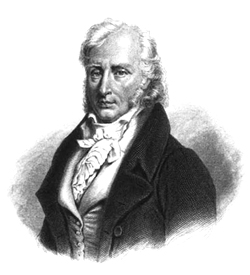Liberty Matters
Constant and Creuzer on Primitive Religion

Alan Kahan is right to remind us of the importance played by German thinkers like Kant for Constant, who spent some time studying in Göttingen and became familiar with many German thinkers (Lessing, Herder, etc.). I should like to add the name of another German student of religion who, according to Paul Bastid's Benjamin Constant et sa doctrine (Paris: Armand Colin, 1966), was perhaps equally if not even more important than Kant for the evolution of Constant's ideas on religion. I have in mind here Georg Friedrich Creuzer, author of an influential book, Symbolik und Mythologie der alten Volker, besonders der Griechen, published between 1810 and 1814.
Creuzer's book is forgotten today; it doesn't even appear on the index of Helena Rosenblatt's Liberal Values. We know for sure that Constant was familiar with Creuzer and took great interest in the possibility of a French translation. The dialogue between the two is interesting for a very simple reason. I don't know if that is entirely correct, but one can say that Constant believed much more in reason than revelation or, at least, he thought that reason follows an independent course in history, sometimes furthered by what he called a "progressive revelation." He also believed in mankind's capacity for constant improvement and devoted considerable attention to studying polytheism, which fascinated him in several regards.
Creuzer defended a thesis opposed to that. He believed that religion was, so to speak, the universal language of nature spoken by all primitive people. He also thought that subsequent developments affected and weakened this original religion, corrupting it in various ways (polytheism being, probably, one of them). As Bastid pointed out, it is unclear whether or not Creuzer defended an original form of monotheism or theism, but what is beyond doubt is that for him, the primitive world had a superior form of religious and moral culture than subsequent religions, including those of the Greeks and the Christian world.
Constant parted company with this view as he refused to locate this perfect religion in a supposed golden age and was reluctant to admit the idea of an original revelation. (He embraced instead the concept of progressive revelation.) To speak about the unchanged unity of religion, hidden to the eyes of the laymen, and to try to uncover an alleged unique and sacred language shared by all primitive people, Constant wrote, amounts to a "chimerical hope." This original kernel of religion, he believed, cannot be found in any such primitive symbols; it can be seen, however, in the nature of man. Worth noting here is the evolutionist and individualist foundation of Constant's views on religion. He shies away from the metaphysical heights of Creuzer and others and prefers to remain close to what he calls la nature de l'homme.
Whether or not that was sufficient to make him a real believer is hard to say. In a letter to his cousin Rosalie from November 15, 1829, he wrote: "Je n'ai que des doutes et je suis trop sceptique pour être incrédule." I love the ambiguity of this line and prefer to let readers judge for themselves what kind of religion Constant embraced.
Copyright and Fair Use Statement
“Liberty Matters” is the copyright of Liberty Fund, Inc. This material is put on line to further the educational goals of Liberty Fund, Inc. These essays and responses may be quoted and otherwise used under “fair use” provisions for educational and academic purposes. To reprint these essays in course booklets requires the prior permission of Liberty Fund, Inc. Please contact oll@libertyfund.org if you have any questions.